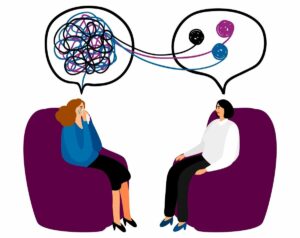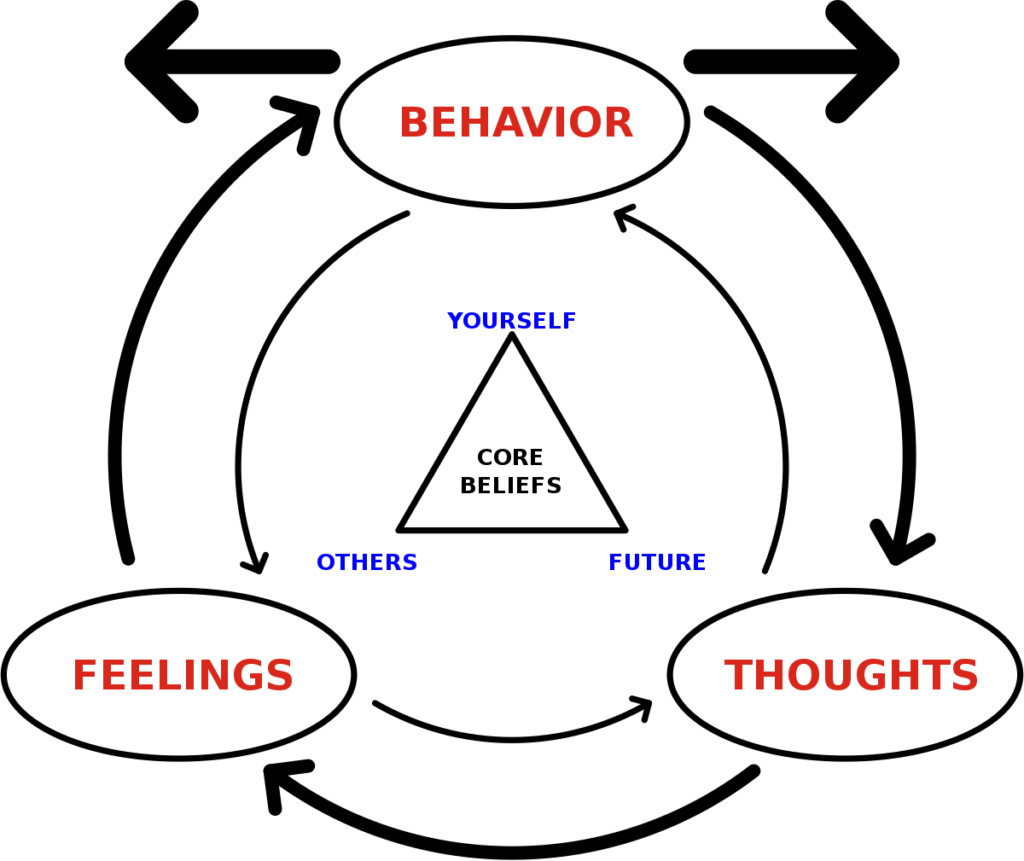Cognitive-behavioral therapy (CBT) is a type of psychotherapy that is widely used to treat mental health conditions. CBT combines cognitive therapy with behavioral therapy, and it has been shown to be an effective treatment for a variety of conditions, including depression, anxiety disorders, and eating disorders. In this blog post, we will discuss the different types of CBT and what they can do for you!
Contents
What Is CBT?
 Cognitive Behavioral Therapy (CBT) is a form of therapy that focuses on how our thoughts, feelings, and behaviors are connected. It teaches us skills to identify and change negative or unhelpful thought patterns and improve our overall well-being. This type of therapy is often used to treat anxiety, depression, and substance abuse.
Cognitive Behavioral Therapy (CBT) is a form of therapy that focuses on how our thoughts, feelings, and behaviors are connected. It teaches us skills to identify and change negative or unhelpful thought patterns and improve our overall well-being. This type of therapy is often used to treat anxiety, depression, and substance abuse.
It is believed that changing our thoughts and behaviors can lead to positive changes in our emotions. CBT is a structured form of therapy, where sessions are typically focused on solving specific challenges or goals.
According to studies, CBT can be just as effective as medication in treating certain mental health conditions. People who use CBT often continue to see benefits even after therapy has ended. Therefore, if you are considering therapy, CBT may be a good option to consider.
What Are The Different Types Of CBT?
There are several different approaches to CBT, some of these are as follows:
Cognitive therapy
It is focused on changing negative thought patterns and beliefs that may be causing distress. Cognitive is generally a short-term therapy, with the goal of teaching skills to continue managing thoughts and emotions on one’s own. For example, someone with anxiety may learn skills to challenge anxious thoughts and replace them with more balanced thoughts.
Behavioral therapy
In this type of CBT, the focus is on identifying and changing negative behaviors. This can include breaking bad habits or managing anger issues. Let’s assume, for example, that a person frequently finds themselves overeating in response to stress. Through behavioral therapy, they can learn coping mechanisms and healthier ways of dealing with stress, ultimately changing their behavior.
Dialectical behavior therapy (DBT)
This approach combines cognitive and behavioral techniques with mindfulness practices to help individuals regulate their emotions. It is often used to treat individuals with borderline personality disorder, but can also be helpful for those struggling with eating disorders, substance abuse, and mood disorders. DBT specifically believes to have four main functions:
- to decrease emotional suffering,
- improve relationships,
- help individuals learn new behaviors, and
- improve overall functioning.
Rational emotive behavior therapy (REBT)
Among all types of CBT, this type focuses on identifying and challenging irrational beliefs that contribute to negative emotions and behaviors. REBT helps people develop a more balanced, realistic way of thinking. For example, someone who believes they are a failure because they made a mistake at work may learn through REBT that mistakes are part of being human and do not define their worth as a person.
Acceptance and commitment therapy
ACT is a type of CBT that focuses on helping individuals accept their thoughts and feelings, rather than trying to change them. It also promotes committing to values-based actions, even in the face of difficult emotions. This type of CBT works well for those with chronic pain or illness, as well as individuals struggling with anxiety and stress.
Mindfulness-based cognitive therapy (MBCT)
 This is a combination of traditional CBT and mindfulness techniques, with a focus on becoming more aware of and accepting thoughts and feelings without judgment. MBCT can be helpful for those struggling with recurrent depression. A study has found that MBCT reduced the risk of depressive relapse by 50% over the course of a year.
This is a combination of traditional CBT and mindfulness techniques, with a focus on becoming more aware of and accepting thoughts and feelings without judgment. MBCT can be helpful for those struggling with recurrent depression. A study has found that MBCT reduced the risk of depressive relapse by 50% over the course of a year.
Each approach has its own techniques and focuses on specific areas of thought patterns or behaviors. These are a few examples for you to consider as there are several other types of CBT available. It’s important to work with a therapist to determine which type is the best fit for your needs and goals.
How Does It Work?
Types of CBT are based on the same principles: identifying and changing negative thought patterns and behaviors to improve mood and overall functioning. This is often done through various therapeutic exercises, such as keeping a thought journal or role-playing difficult situations.
During the session, the therapist and patient work together to identify negative patterns and come up with strategies to change them. CBT can also involve exposure therapy, gradually exposing the patient to fear or trigger in a controlled environment to help them cope and diminish the negative response.
In addition to individual therapy, there are also types of CBT that can be done in group settings or even through self-help books and online resources. The working of CBT is usually short-term, with the goal being to equip the patient with tools to continue managing their mental health on their own.
Therefore, if you are looking for a form of therapy that is solution-focused and aims to empower you in managing your own well-being, CBT might be worth considering. It has been proven effective for various mental health concerns, including anxiety and depression. Talk to a therapist about what type of CBT may be most helpful for your specific needs.
What Conditions It Can Help With?
There is a wide range of issues that CBT can be used to treat, including:
- Depression
- Anxiety disorders
- Phobias
- Obsessive-compulsive disorder
- Post-traumatic stress disorder
These types of conditions are often caused or worsened by negative thought patterns, and CBT can help to identify and challenge these thoughts in order to improve overall mood and well-being.
Additionally, CBT techniques can assist with other conditions as well, such as:
- Chronic pain
- Insomnia
- Eating disorders
- Substance abuse issues
- Relationship problems
CBT can also be used in conjunction with medication and other therapy approaches for more comprehensive treatment. It is important to work with a therapist who is trained and experienced in CBT in order to get the most benefit from this type of therapy.
Overall, CBT can provide helpful tools for managing a variety of mental health and behavioral issues and improve overall well-being. It is worth considering if you are struggling with any of the above conditions or experiencing difficulties in your daily life. Give it a try and see how it can benefit you!
What Are The Benefits of CBT Types?
 When it comes to mental health, different types of CBT can have a variety of benefits. Some of the benefits are as follows:
When it comes to mental health, different types of CBT can have a variety of benefits. Some of the benefits are as follows:
Improved mood
It is common for individuals to experience an improvement in their mood after participating in CBT. Because CBT helps individuals identify and challenge negative thought patterns, they often experience an increase in positive thinking. For example, someone with depression may notice an improvement in their overall mood and decreased symptoms of depression.
Increased coping skills
CBT can also help individuals develop coping skills in order to manage difficult emotions and situations. This may include developing strategies for stress management, problem-solving, and distress tolerance. A person with anxiety may learn relaxation techniques to help cope with anxious thoughts and feelings.
Improved relationships
CBT can also improve interpersonal relationships. This may involve learning communication skills, setting boundaries, and resolving conflicts. It is especially helpful in improving relationships with romantic partners or family members.
Decreased anxiety and depression
It is commonly used to treat anxiety and depression, as it helps individuals identify and change negative thought patterns and behaviors that contribute to their distress. For example, someone with social anxiety may learn to challenge their fear of being judged by others and gradually face situations that previously caused them intense anxiety.
Improved self-esteem
One of the major benefits is improved self-esteem. CBT helps individuals challenge negative thought patterns and replace them with more positive and realistic ones. This can lead to improved confidence in oneself and a better self-image.
So these are just a few benefits of CBT. This type of therapy can also be helpful in managing stress, improving relationships and communication skills, and increasing coping mechanisms for difficult situations. It can also be used in conjunction with medication to treat various mental health disorders such as anxiety and depression.
If you think CBT may be a good fit for you, consider talking to a therapist about incorporating it into your treatment plan. You may be surprised at the positive changes it can bring to your life. Happy healing!
Note: This is just a hypothetical example and is not meant to be professional advice or a substitute for therapy. Please consult with a licensed therapist before starting any new treatment plan.
How To Find The Right Therapist?
 Finding the right therapist is crucial to the success of CBT. It’s important to find a therapist who has experience and training in the specific type of CBT you are seeking (such as acceptance and commitment therapy or cognitive processing therapy).
Finding the right therapist is crucial to the success of CBT. It’s important to find a therapist who has experience and training in the specific type of CBT you are seeking (such as acceptance and commitment therapy or cognitive processing therapy).
Here are a few tips that can help you find the right therapist for you:
- Ask for recommendations from friends, family, or your primary care physician.
- Look for a therapist who is licensed and certified in CBT.
- Make sure they have experience treating the issue(s) you are seeking therapy for.
- Meet with a few therapists before deciding on one to ensure they are a good fit for you.
By finding the right therapist and committing to the process, CBT can be extremely effective in reducing symptoms and improving overall well-being. This can lead to a better quality of life and increased functioning in daily activities.
So, do not hesitate to seek out CBT for your mental health needs. It can truly make a difference in your life. Happy therapy hunting!
Conclusion
In conclusion, types of CBT are diverse and can be tailored to fit different individuals and their specific needs. It’s important to find a therapist who is well-versed in the type of CBT that will most benefit you, as well as being open and willing to try new techniques if necessary.
Remember, the goal of CBT is not just symptom relief but long-term behavior change in order to improve overall well-being and happiness. With the right therapist and techniques, CBT can be a powerful tool for personal growth and transformation. Give it a try!
If you are struggling then please contact Therapy Mantra for help. The team of experts here will be more than happy to help you out and get you on the path to a better life. Contact us today to learn more about our services. You can also book an online therapy session or download our free Android or iOS app.


